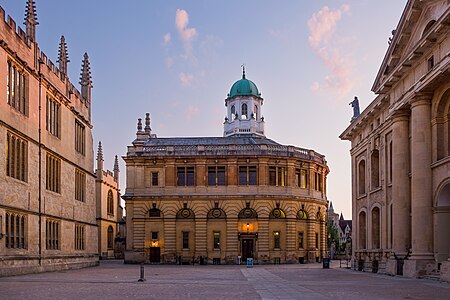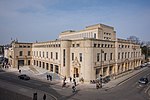Sheldonian Theatre
1669 establishments in EnglandBuildings and structures completed in 1668Buildings and structures of the University of OxfordChristopher Wren buildingsConcert halls in England ... and 8 more
Culture in OxfordEngvarB from September 2013Grade I listed buildings in OxfordGrade I listed theatresMusic in OxfordMusic venues in OxfordshireTheatres in OxfordTourist attractions in Oxford

Sheldonian Theatre, located in Oxford, England, was built from 1664 to 1669 after a design by Christopher Wren for the University of Oxford. The building is named after Gilbert Sheldon, Warden of All Souls College and later chancellor of the University. Sheldon was the project's main financial backer. The theatre is used for music concerts, lectures and University ceremonies, but not for drama until 2015 when the Christ Church Dramatic Society staged a production of The Crucible by Arthur Miller.
Excerpt from the Wikipedia article Sheldonian Theatre (License: CC BY-SA 3.0, Authors, Images).Sheldonian Theatre
Broad Street, Oxford City Centre
Geographical coordinates (GPS) Address Phone number Website External links Nearby Places Show on map
Geographical coordinates (GPS)
| Latitude | Longitude |
|---|---|
| N 51.7543 ° | E -1.255 ° |
Address
Sheldonian Theatre
Broad Street
OX1 3AZ Oxford, City Centre
England, United Kingdom
Open on Google Maps









